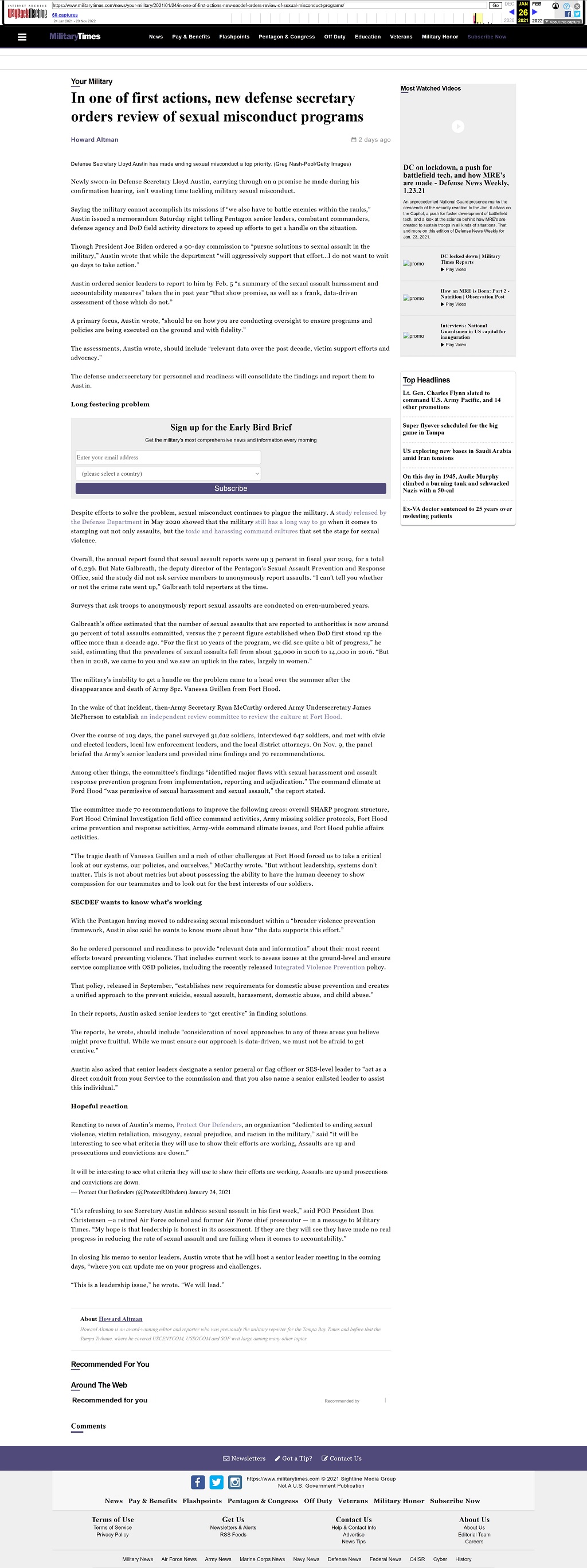
Your Military
By Howard Altman / Military Times / January 23, 2021
PHOTO: Defense Secretary Lloyd Austin has made ending sexual misconduct a top priority. (Greg Nash-Pool/Getty Images)
Newly sworn-in Defense Secretary Lloyd Austin, carrying through on a promise he made during his confirmation hearing, isn’t wasting time tackling military sexual misconduct.
Saying the military cannot accomplish its missions if “we also have to battle enemies within the ranks,” Austin issued a memorandum Saturday night telling Pentagon senior leaders, combatant commanders, defense agency and DoD field activity directors to speed up efforts to get a handle on the situation.
Though President Joe Biden ordered a 90-day commission to “pursue solutions to sexual assault in the military,” Austin wrote that while the department “will aggressively support that effort…I do not want to wait 90 days to take action.”
Austin ordered senior leaders to report to him by Feb. 5 “a summary of the sexual assault harassment and accountability measures” taken the in past year “that show promise, as well as a frank, data-driven assessment of those which do not.”
A primary focus, Austin wrote, “should be on how you are conducting oversight to ensure programs and policies are being executed on the ground and with fidelity.”
The assessments, Austin wrote, should include “relevant data over the past decade, victim support efforts and advocacy.”
The defense undersecretary for personnel and readiness will consolidate the findings and report them to Austin.
Long festering problem
Despite efforts to solve the problem, sexual misconduct continues to plague the military. A study released by the Defense Department in May 2020 showed that the military still has a long way to go when it comes to stamping out not only assaults, but the toxic and harassing command cultures that set the stage for sexual violence.
Overall, the annual report found that sexual assault reports were up 3 percent in fiscal year 2019, for a total of 6,236. But Nate Galbreath, the deputy director of the Pentagon’s Sexual Assault Prevention and Response Office, said the study did not ask service members to anonymously report assaults. “I can’t tell you whether or not the crime rate went up,” Galbreath told reporters at the time.
Surveys that ask troops to anonymously report sexual assaults are conducted on even-numbered years.
Galbreath’s office estimated that the number of sexual assaults that are reported to authorities is now around 30 percent of total assaults committed, versus the 7 percent figure established when DoD first stood up the office more than a decade ago. “For the first 10 years of the program, we did see quite a bit of progress,” he said, estimating that the prevalence of sexual assaults fell from about 34,000 in 2006 to 14,000 in 2016. “But then in 2018, we came to you and we saw an uptick in the rates, largely in women.”
The military’s inability to get a handle on the problem came to a head over the summer after the disappearance and death of Army Spc. Vanessa Guillen from Fort Hood.
In the wake of that incident, then-Army Secretary Ryan McCarthy ordered Army Undersecretary James McPherson to establish an independent review committee to review the culture at Fort Hood.
Over the course of 103 days, the panel surveyed 31,612 soldiers, interviewed 647 soldiers, and met with civic and elected leaders, local law enforcement leaders, and the local district attorneys. On Nov. 9, the panel briefed the Army’s senior leaders and provided nine findings and 70 recommendations.
Among other things, the committee’s findings “identified major flaws with sexual harassment and assault response prevention program from implementation, reporting and adjudication.” The command climate at Ford Hood “was permissive of sexual harassment and sexual assault,” the report stated.
The committee made 70 recommendations to improve the following areas: overall SHARP program structure, Fort Hood Criminal Investigation field office command activities, Army missing soldier protocols, Fort Hood crime prevention and response activities, Army-wide command climate issues, and Fort Hood public affairs activities.
“The tragic death of Vanessa Guillen and a rash of other challenges at Fort Hood forced us to take a critical look at our systems, our policies, and ourselves,” McCarthy wrote. “But without leadership, systems don’t matter. This is not about metrics but about possessing the ability to have the human decency to show compassion for our teammates and to look out for the best interests of our soldiers.
SECDEF wants to know what’s working
With the Pentagon having moved to addressing sexual misconduct within a “broader violence prevention framework, Austin also said he wants to know more about how “the data supports this effort.”
So he ordered personnel and readiness to provide “relevant data and information” about their most recent efforts toward preventing violence. That includes current work to assess issues at the ground-level and ensure service compliance with OSD policies, including the recently released Integrated Violence Prevention policy.
That policy, released in September, “establishes new requirements for domestic abuse prevention and creates a unified approach to the prevent suicide, sexual assault, harassment, domestic abuse, and child abuse.”
In their reports, Austin asked senior leaders to “get creative” in finding solutions.
The reports, he wrote, should include “consideration of novel approaches to any of these areas you believe might prove fruitful. While we must ensure our approach is data-driven, we must not be afraid to get creative.”
Austin also asked that senior leaders designate a senior general or flag officer or SES-level leader to “act as a direct conduit from your Service to the commission and that you also name a senior enlisted leader to assist this individual.”
Hopeful reaction
Reacting to news of Austin’s memo, Protect Our Defenders, an organization “dedicated to ending sexual violence, victim retaliation, misogyny, sexual prejudice, and racism in the military,” said “it will be interesting to see what criteria they will use to show their efforts are working, Assaults are up and prosecutions and convictions are down.”
It will be interesting to see what criteria they will use to show their efforts are working. Assaults are up and prosecutions and convictions are down.
— Protect Our Defenders (@ProtectRDfnders) January 24, 2021
“It’s refreshing to see Secretary Austin address sexual assault in his first week,” said POD President Don Christensen —a retired Air Force colonel and former Air Force chief prosecutor — in a message to Military Times. “My hope is that leadership is honest in its assessment. If they are they will see they have made no real progress in reducing the rate of sexual assault and are failing when it comes to accountability.”
In closing his memo to senior leaders, Austin wrote that he will host a senior leader meeting in the coming days, “where you can update me on your progress and challenges.
“This is a leadership issue,” he wrote. “We will lead.”
Wayback image

Other image

